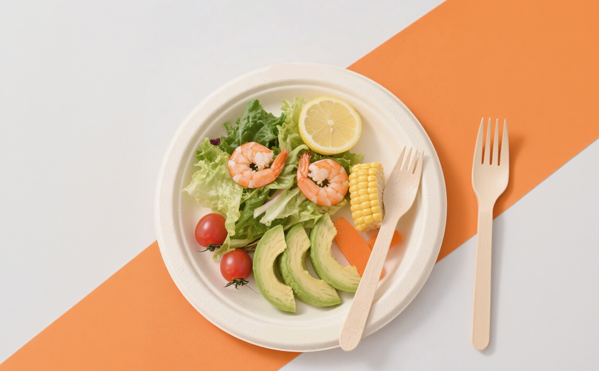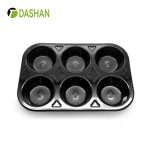Introduction – Festivals, Fun, and Food Waste
Music festivals are cultural milestones that combine music, food, drink, and community. Yet behind the stages and lights, lies a sobering fact: a 3-day event with 60,000 attendees can generate more than 500,000 cups, 200,000 food boxes, and 150,000 utensils.
For decades, plastic food packaging—PP, PET, and PS—was the default. Strong, stackable, and cheap, but nearly impossible to recycle at festival scale. Today, global regulations and consumer demand for eco-friendly experiences are reshaping the market:
-
EU Single-Use Plastics Directive (SUPD): bans plastic cups, cutlery, and food boxes.
-
California SB54 (USA): mandates a 25% cut in single-use plastics by 2032.
-
Canada 2023 Ban: targets cutlery, bags, and containers.
-
Asia-Pacific bans: India, Thailand, and Malaysia restrict foam and plastic at events.
Meanwhile, 72% of attendees say compostable packaging improves their experience, and sponsors increasingly require zero-waste branding.

T-72 Hours: Forecasting Packaging Demand
Accurate forecasting is essential. Both plastic and compostables must meet volume needs, but their recovery pathways differ.
Average Use per Person per Day:
-
Cups: 3 (beer, water, soda)
-
Food Boxes: 1.2
-
Cutlery: 0.8 sets
-
Waste Bags: 1 per 50 people
Example: 3-Day Festival (60,000 visitors/day)
-
Plastic Cups (PET/PP): 540,000 units
-
Compostable PLA Cups: 540,000 units
-
Bagasse Clamshell Boxes: 216,000 units
-
Kraft Salad Bowls: 120,000 units
-
CPLA Cutlery: 144,000 units
📊 Table 1: Festival Packaging Forecast
| Packaging Type | 3-Day Demand | Plastic Option | Compostable Option |
|---|---|---|---|
| Cold Cups | 540,000 | PET/PP Cups | PLA Cups |
| Food Boxes | 216,000 | PP Trays | Bagasse Clamshells |
| Salad Bowls | 120,000 | PET Salad Bowls | Kraft + PLA Lids |
| Cutlery Sets | 144,000 | PS/PP Cutlery | CPLA Utensils |
T-48 Hours: Procurement & Container Optimization
Plastic
-
Advantages: Low unit price, high density (more items per container), long shelf life.
-
Limits: Fails under new bans, poor recycling rates.
Compostables
-
Advantages: Ban-compliant, natural look, compostable at scale.
-
Limits: Higher MOQ cost, requires industrial composting.
📦 Container Optimization Example (40HQ):
-
PET Cups: ~250,000 units
-
PLA Cups: ~190,000 units
-
Bagasse Boxes: ~150,000 units
-
CPLA Cutlery: ~250,000 pieces
Suppliers like Xiamen Dashan® help organizers consolidate SKUs into one container—cups, trays, bowls, and cutlery—lowering cost per unit.

T-24 Hours: On-Site Distribution & Training
Whether plastic or compostable, execution matters.
-
Plastic Packaging: Easier for vendors with fewer training needs, but complicates waste sorting.
-
Compostable Packaging: Requires a 3-bin system (Compostable / Recyclable / Landfill) and staff training.
Dashan provides training materials, signage kits, and color-coded crates, ensuring volunteers and vendors understand which materials go where.
Event Execution (0–72 Hours)
Plastic Performance:
-
Reliable for hot, greasy meals (PP, CPET).
-
Lower upfront cost.
-
Compliance risks in regulated regions.
Compostable Performance:
-
PLA cups: stackable, strong for cold drinks.
-
Bagasse boxes: rigid, leak-resistant for street food.
-
Kraft bowls: premium presentation for salads.
-
CPLA cutlery: heat-resistant and durable.
📊 Table 2: Plastic vs. Compostables at Festivals
| Feature | Plastic | Compostables (Dashan®) |
|---|---|---|
| Leak Resistance | Medium | High |
| Stackability | High | High |
| Shelf Appeal | Neutral | Eco-branded look |
| Compliance Risk | High | None |
| Consumer Trust | Low | +10–15% loyalty boost |
Post-Event Recovery (T+24 to T+72)
-
Plastic: Limited recycling at festivals due to contamination, often ends in landfill.
-
Compostables: Industrial composting achieves ≥70% diversion rates, with reduced CO₂ footprint.
Key Steps:
-
Bin separation on-site
-
Waste weighing & auditing
-
Transport to composting facility
-
Sustainability reporting to sponsors
Case Study – European Summer Festival with Dashan® Solutions
Event: 180,000 attendees over 3 days
Challenge: EU SUPD compliance + poor waste diversion history
Solution (by Xiamen Dashan®):
-
PLA Cups: 540,000 units (12–20oz mix)
-
Bagasse Clamshell Boxes: 120,000 units
-
Kraft Salad Bowls: 80,000 units
-
CPLA Cutlery: 150,000 sets
-
Compostable Waste Bags: 3,600 units
Results:
-
Waste diversion rate: 72%
-
Negative complaints: -60% vs. last year
-
Social media positivity: +200%
-
ROI: Break-even in 6 months from reduced fines + better sponsor support
Why Organizers Choose Xiamen Dashan®
-
Certified under EN13432, ASTM D6400, BPI, TÜV Austria
-
Full material range: PET, RPET, CPET, PLA, PP, PS
-
Custom printing & OEM/ODM options for brand promotion
-
Global export experience (Europe, North America, APAC)
-
One-stop festival kits: cups, bowls, trays, cutlery, bags

Future Outlook – Festivals in 2030
-
Compostables expected to reach price parity with plastics through subsidies and scaling.
-
Zero-waste certification will become mandatory for sponsors.
-
Plastic-free festivals will move from niche to mainstream.
Conclusion
Music festivals no longer need to choose between cost efficiency (plastics) and compliance & sustainability (compostables). With the right forecasting, procurement, and recovery systems, both can coexist—but compostables clearly align with global trends.
Xiamen Dashan® empowers festival organizers with flexible solutions: from cost-effective PP/PET containers to fully compostable kits. By partnering early, festivals achieve compliance, sponsor loyalty, and unforgettable eco-friendly experiences.
FAQ
Q1: Are plastic cups still allowed at festivals?
Not in regions under SUPD (EU) or Canada bans. PP/PET may still be used elsewhere, but compliance risks remain.
Q2: How many compostable cups are needed for a 3-day, 60k-person festival?
Around 500,000–600,000 PLA cups.
Q3: Which is cheaper—plastic or compostables?
Plastics are still cheaper per unit, but compostables reduce compliance fines and boost sponsor ROI.
Q4: What certifications matter for compostables?
EN13432 (EU), ASTM D6400 (US), BPI, TÜV Austria.
Q5: Can Dashan supply both plastics and compostables?
Yes. Dashan offers PP, PET, RPET for cost-driven events, and PLA, bagasse, CPLA for eco-certified festivals.
References
-
European Commission – Single-Use Plastics Directive (SUPD)
https://environment.ec.europa.eu/topics/plastics/single-use-plastics_en -
California SB54 – Plastic Pollution Producer Responsibility Act
https://calrecycle.ca.gov/plastics/sb54 -
Government of Canada – Single-Use Plastics Prohibition Regulations
https://www.canada.ca/en/environment-climate-change/services/managing-reducing-waste/reducing-plastic-waste/single-use-plastics.html -
Ellen MacArthur Foundation – The New Plastics Economy
https://ellenmacarthurfoundation.org/the-new-plastics-economy -
United Nations Environment Programme (UNEP) – Single-Use Plastics: A Roadmap for Sustainability
https://www.unep.org/resources/report/single-use-plastics-roadmap-sustainability -
Statista – Global Plastic Waste Generation and Recycling Rates
https://www.statista.com/statistics/1071152/global-plastic-waste-generation-recycling -
Green Sports Alliance – Composting in Sports and Entertainment Venues
https://greensportsalliance.org/composting-in-sports-and-entertainment-venues -
WRAP UK – Compostable Packaging Guidance
https://wrap.org.uk/resources/guide/compostable-packaging -
Biodegradable Products Institute (BPI) – Certified Compostable Standards
https://bpiworld.org/ -
TÜV Austria – OK Compost Certification
https://www.tuv-at.be/green-mark/ok-compost




